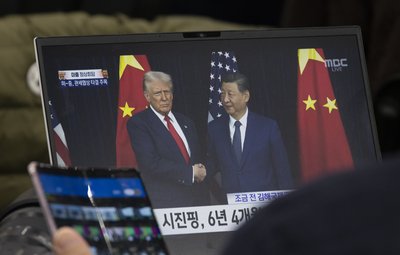The publication says that US President Donald Trump's order to the Department of Defense to begin nuclear weapons testing was likely prompted by Russian dictator Vladimir Putin's announcement that Russia had successfully tested a nuclear-powered cruise missile capable of carrying nuclear weapons.
Ankit Panda, a senior fellow at the Carnegie Endowment for International Peace, believes that if the US resumes nuclear testing, it would essentially give China and Russia complete freedom to resume large-scale nuclear testing, something neither country has done for years.
"The nuclear non-proliferation regime is now under enormous pressure. Russia, China and the United States cannot even agree on the basic principles of what really drives the non-proliferation regime," he was quoted as saying by the NYT.
Panda and other experts said Trump may have been referring to a desire to test nuclear-capable missiles rather than detonating nuclear devices underground, and expressed hope that the US president would provide the necessary clarification.
However, it is noted that such aggressive statements may increase Beijing's suspicion of US nuclear intentions, arguing that nuclear weapons are one of the areas where distrust between China and the US has increased, and the prospects for a quick agreement are slim.
China is rapidly expanding its nuclear arsenal
The article states that China is rapidly expanding its nuclear arsenal and currently has about 600 nuclear warheads, most of which are designed for land-based missiles. However, this is still far fewer than the thousands of nuclear warheads possessed by the United States and Russia.
“Russia has almost completed the modernization of its entire nuclear weapons arsenal, and China is modernizing and expanding its arsenal at an astonishing rate,” Elbridge Colby, deputy secretary of defense in the Trump administration, said earlier this year.
As the NYT reports, Beijing has announced “strengthening strategic deterrence” in its new five-year development plan. It notes that this language includes nuclear forces. Last month, China showed off its growing collection of nuclear-capable missiles, including those launched from submarines and bombers, during a military parade in Beijing.
"Xi Jinping used the parade to emphasize the maturity of China's 'nuclear triad' - the ability to launch a nuclear strike from land, sea and air. The pace of China's nuclear weapons development will not slow down or change just because of Trump's statement," said Lin Po-chou, a researcher at the Taipei Institute for Defense and Security Studies.

Beijing may be preparing to resume underground nuclear tests
The article claims that satellite images show that China may be preparing to resume underground nuclear tests, in an effort to demonstrate its readiness to respond in kind if other countries do the same.
In total, Beijing has conducted about 45 tests, far fewer than the United States or Russia. As a result, Chinese scientists likely have less experimental data to develop new warheads. After 1996, China, like other nuclear powers, limited itself to so-called “subcritical tests,” which do not result in nuclear explosions.
But new satellite images of China's nuclear test site in Xinjiang show that construction work is resuming, including new tunnels that could be used for underground testing.
If Trump orders new nuclear tests, Panda estimates it will take the US about 18 months to prepare the Nevada Test Site. China and Russia, he says, could do it a little faster.
The United States announced the immediate start of nuclear weapons testing
As UNIAN previously reported, on October 30, Trump announced the immediate start of nuclear weapons testing, the first in 33 years. He said on social media that he had ordered the Pentagon to conduct tests of the American nuclear arsenal"on equal terms" with other nuclear powers.
Later, on Air Force One, Trump confirmed that resuming US nuclear testing after a 30-year moratorium would be"appropriate," but also said he was in talks with Russia about denuclearization. He did not specify when or where the US nuclear tests would be conducted, saying only:"We have test sites. It will be announced."
The Kremlin responded to Trump's statements. The Russian dictator's spokesman, Dmitry Peskov, stated that the tests of the Burevestnik cruise missile were not related to a nuclear explosion and did not violate the ban on nuclear tests.
"Regarding the tests of the Poseidon drone and the Burevestnik missile, we hope that the information was conveyed to President Trump correctly," Kremlin spokesman Dmitry Peskov told reporters, including an AFP correspondent, during a daily press conference.

